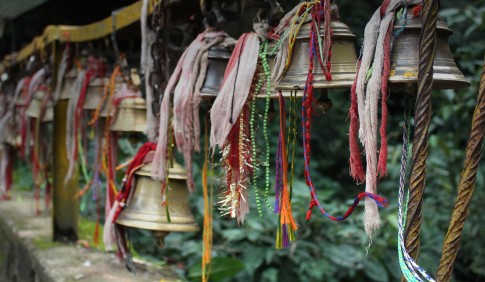Laos, Thailand, Cambodia (6-Week Sample Itinerary)
The following is a sample itinerary based on past courses; actual itineraries may vary.
| Week 1 Luang Prabang, Laos | Our journey begins in the quiet mountains of Luang Prabang. Here we spend a few days orienting ourselves to the academic themes, independent goals and winding itinerary of the odyssey to come. After acclimatizing to culture, language and cuisine, we head into the city. Luang Prabang is a UNESCO World Heritage site and one of the best preserved examples of French colonial architecture anywhere on earth. The tranquil town is comprised of palaces, monasteries, cafes and colonial schools perched on a peninsula jutting into the Mekong. Luang Prabang provides a poignant setting for sinking into studies of meditation and mindfulness, artistic traditions and discussions on ecotourism. Surrounded by stunning wilderness, we take day excursions to the famous Khuang Si waterfalls, work with local craftsmen and swim in the tributaries of the Mekong observing young Buddhist monks going about their daily duties. |
|---|---|
| Week 2 Vientiane, Laos | From Luang Prabang, we board a winding 12-hour bus ride through the awe-inspiring mountainscapes of Laos, slinking our way toward the capital city of Vientiane. While in Vientiane we turn our attention to social agendas and prioritize meetings with local NGOs, activists, educators and agents of change who have committed themselves to improving the state of the nation. Laos has recently emerged from a decades-old closed door policy and is finally healing after the horrors of the US’ Secret War. We meet with representatives from COPE, MAG and a number of local organizations committed to the long term health and wellbeing of the populace through the clearance of millions of UXOs (unexploded ordnance). |
| Week 3 Thaket, Laos & Nakon Phanom, Thailand | From Vientiane, we hug the banks of the river while continuing south toward the idylls of central Laos. We first make our way into the protected wilderness of the sparsely populated Khammoune province. In the mountains separating Laos and Vietnam, we journey into the pristine mountains and visit the celebrated nam Teun II dam, which stands as a model for responsible and sustainable development of hydropower. Further still, we take a boat ride into the subterranean rivers of Kong Lor cave near the Ho Chi Minh Trail and hike into the protected elephant habitats near Nahin. Upon arriving back on the banks of the Mekong, we cross to a Christian island known as Baan Don Donn near Thakhek to begin our first homestay. The homestay extends for nearly a week, during which time students gather in the mornings as a group to discuss critical issues related to development, Mekong mega-dam projects, the eco-tourism boom and Chinese economic influence in Southeast Asia. Students will build understanding of the historical backdrops and contemporary topics that shape the regional and worldview of Laos people. Then, after saying goodbye to our host families, we cross the Mekong to Nakhon Phanom, Thailand to begin the second half of our journey. |
| Week 4 Ubon Ratchathani, Thailand & Siem Reap, Cambodia | Crossing to Thailand, we feel an immediate difference between the two countries. Laos is the poorest Southeast Asian nation and the “Please Don’t Rush” mentality is not as embraced in Thai society. Infrastructure, healthcare, education and general standards of living are higher across here, culminating in unbreakable livestock fencing, pristine 7/11s, and steel reinforced multi-laned highways that make travel a breeze. But with development has come sacrifice. Journeying to the village of Baan Tamui, we commence a multi-day community stay with relocated families from the Mun River dam that flooded their homes in the 1990s. Here we are able to discuss more freely the current situation the Mekong River is facing politically and ecologically while enjoying home cooked meals and fishing excursions. From here we travel through Ubon Ratchathani and onto Siem Reap, Cambodia. |
| Week 5 Battambang & Phnom Penh, Cambodia | Upon arriving in Siem Reap, we retreat to the tranquil grounds of Meta Karuna Reflection Centre, lying on the outskirts of the city and the famed Angkor Wat temple complex. After exploring the main temple site by bicycle and tuk-tuk, we head further afield to explore Angkorian ruins around the outskirts of the city, and meet with education, WASH and healthcare NGOs. From here, the students take the reins of the course, facilitating a five day Expedition Phase between Siem Reap and Phnom Penh. Using their new travel skills, students organize transport, bargain with tuk-tuk drivers and design activities with the help of instructors that will see us arriving to Phnom Penh safely. In the capital, we meet with Khmer Rouge survivors and pay respect to the dead at the S21 and Killing Fields genocide musuems. |
| Week 6 Kep & Kampot Cambodia | Moving into the final week of the course, we venture to the riverine and coastal townships of Kampot and Kep. We learn about the garment industry, the spice trade, swing on vines inside a bat cave, discuss the realities of the Khmer Rouge and hike through the forest to bathe in a pristine waterfall. Kampot also offers student a chance to learn about the Cham Muslim people of Cambodia while assisting the community with a mangrove restoration project meant to keep rising salt water from inundating crops. In these calm environs, with our hands in the wet sand, we engage in transference activities aimed at self-reflection and in celebration of the incredible encounters we've had over the last month. |

